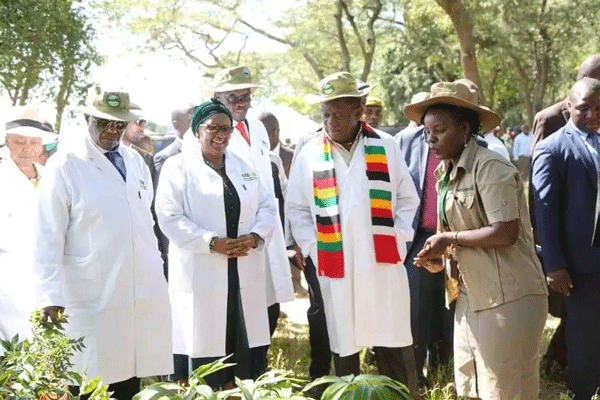

Environment By Kennedy Nyavaya
President Emmerson Mnangagwa, along with an entourage of government officials, descended on Zengeza 1 in Chintungwiza for the May edition of the national clean-up campaign a fortnight ago.
Vice-Presidents Constantino Chiwenga and Kembo Mohadi as well as Defence minister Oppah Muchinguri were doing the same in Kuwadzana, Waterfalls and Africa Unity Square respectively.
The National Environment Cleaning Day is an event scheduled for the first Friday of each calendar month in an effort to ensure sustainable environmental management and waste disposal systems, according to Mnangagwa. The president launched this programme last December.
Ideally the entire nation is on that day, supposed to put all hands on deck in cleaning their surroundings from 8am to 10am.
However, in reality the stipulated time appears to have turned into some corporates’ chance for grandstanding while the bulk of other institutions and individuals go about their days without any bother.
Colourful, neatly branded t-shirts and hats are conspicous around the Harare city centre, for example, as employees of different businesses tidy the immediate front of their premises.
Pictures are taken and posted on social media for people to see and perhaps get the illusion that the cleaning day is working.
- Chamisa under fire over US$120K donation
- Mavhunga puts DeMbare into Chibuku quarterfinals
- Pension funds bet on Cabora Bassa oilfields
- Councils defy govt fire tender directive
Keep Reading
Developing a culture of cleanliness
By end of day on May 3 hardly a few hours after the cleaning, the streets had returned to their usual messy state. The culture of cleaning is evindently absent in the people’s minds.
This is a cue that more needs to be done to influence a culture of hygiene above anything else. Even without the visible litter, public spaces are smelly in what spells a dysfunction of the sanitation system in the country.
The dirt is a mirror of socioeconomic activities in the country, which are largely informal.
This is testament that all forms of corruption, even the unseen, need to be wiped out completely before the nation can talk about outward hygiene.
The idea of cleanliness must begin in the mind before it translates to manual labour if it is going to be sustainable.
Depoliticise the campaigns
One would be justified to think that the president’s declaration has remained an idea understood only in society’s high echelons but has failed to trickle down to the ordinary man in the street.
This is because after five months the day seems much of the president and his loyalists’ initiative.
Mnangagwa himself was quoted telling gatherers that he had seen civil servants remain in their offices as he left for the clean-up.
“These people [act as if they] do not know that I had declared this day as a national day. But let me say this; we shall see,” he reportedly said apparently threatening to fire them.
While it may appear as gross insubordination by employees, the truth is that with time the drive’s impetus is fizzling out with no derivable results because of the way it is conducted.
Dressed in formal wear and white coats as they travel in convoys of espensive cars to the clean-up rallies, Mnangagwa and his officials do not appear like street cleaners at all.
Added to it, most of the citizenry are generally not interested in speeches, especially those that appear to absolve government of any wrong doing.
More often than not, the speeches are beginning to sound too political in a way that begs the question whether the politicians are sincere about the initiative’s goals.
Ultimately, the campaigns areat side-lining followers of certain political parties who may feel they have become political rallies.
Government should channel funds towards environmentally useful tools instead
Perhaps government’s efforts could be felt more if they channel the resources siphoned by the logistical planning of places around the country towards buying more bins, brooms and face masks among other things.
Having a bloated delegation going for things like allowances and new dustcoats is baffling considering that cities like Harare are struggling to fuel waste collection vehicles at the moment.
The synthetic sight of the president holding a shovel and a broom has become an insignificant monotony that has failed to get any buy in from the general citizens.
It is just not worth it after all because realistically no one goes street cleaning wearing a scarf.
Enforce stern laws
Besides merely lobbying citizens to be environmental conscious, the government should rather place more energy in assisting the Environmental Management Agency (EMA) by giving them more power to enforce environmental laws.
If EMA remains a virtually toothless bulldog as it is now, anyone with a dream to see a clean environment can kiss it goodbye because the current mess is a direct translation of laxity in law enforcement.











